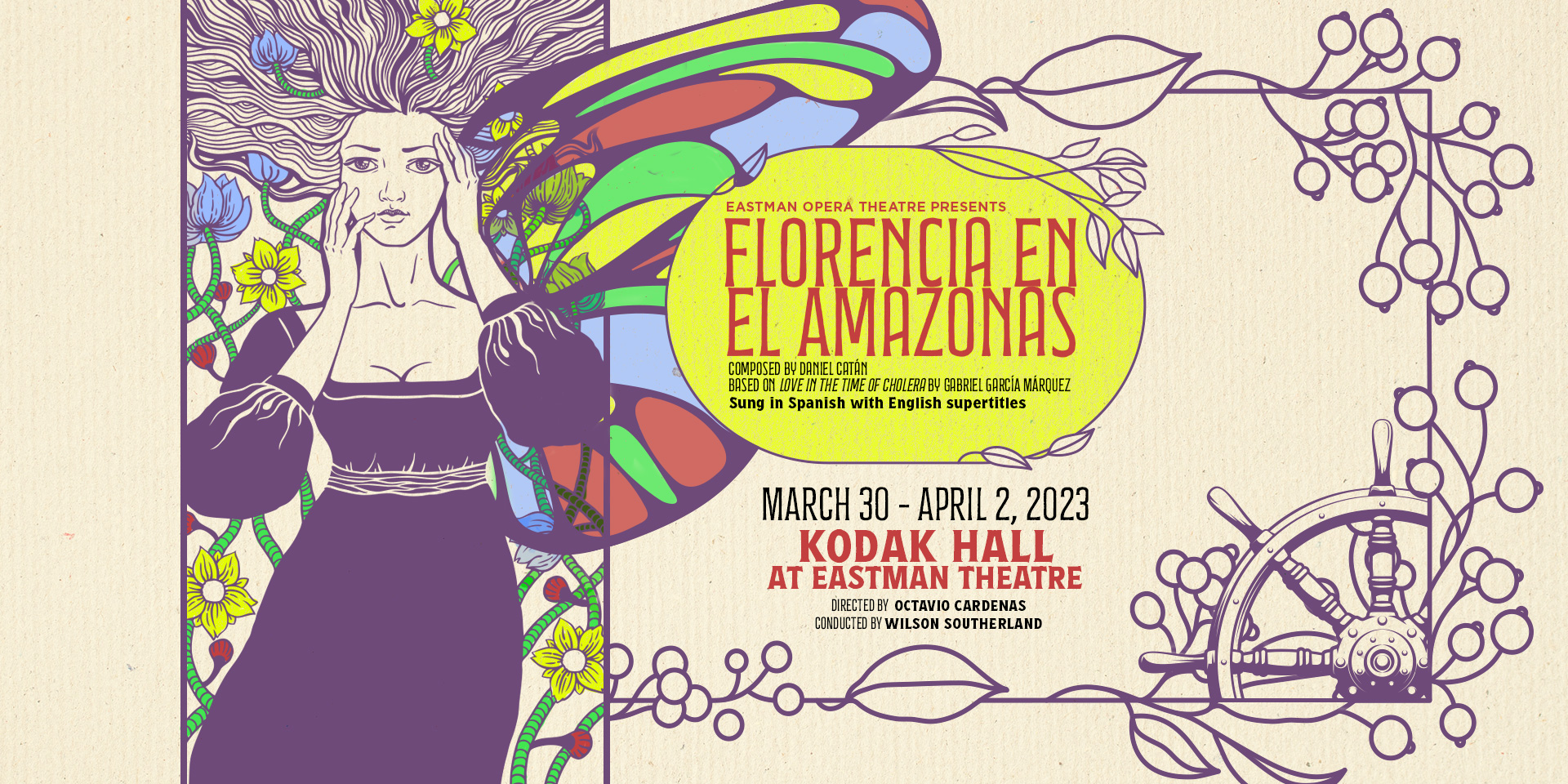“Why would Florencia open her arms?” asks director Octavio Cardenas in a recent rehearsal of Daniel Catán’s Florencia en el Amazonas, the first Spanish language opera to be performed by the Eastman Opera Theatre. The opera will run Thursday through Sunday, March 30 to April 2, in Kodak Hall at Eastman Theatre.
He instructs the student performer to expand her arms and show the opera’s quintessential magical elements unfold in front of the audience. “Become the butterfly—but she needs to have a reason why.”
Cardenas is the Eastman School of Music’s recently hired assistant professor of opera, and Florencia marks his Eastman directorial debut. Cardenas was the former director of opera at Baylor University and brings a slew of highly regarded experiences directing opera across the United States and beyond. More than stage gimmicks, Cardenas’s focus is on the characters. “I’m interested in the interaction with the singers and the story, and to make it real, as much as the story allows it.”
“One of Octavio’s gifts is his ability to set up the parameters of what he wants to see in a scene in terms of emotion, while giving us the freedom to discover our own medium of expression,” says Sofia Scattarreggia, a DMA vocal student at Eastman who will perform the title role of Florencia Grimaldi on Thursday and Saturday nights. Amanda Hornig, an undergraduate vocal major who performs Florencia on Friday and Sunday, agrees. “Octavio really helps the cast embrace the humanity of each of our characters and trusts us not to forget to bring a little bit of ourselves to the character as well.”
The story follows Brazilian opera diva Florencia en route to her next performance in Manaus, Brazil on a steamboat called the El Dorado, which takes the passengers down the exotic Amazon River. Florencia’s hidden hope, though, is to be reunited with an old lover, Cristóbal, a butterfly hunter who disappeared to the Amazon rainforest. The journey down the river and its otherworldly setting allows Florencia—and the other passengers—to reflect on the meaning of love and the unexplored paths of life.
Florencia is plagued by a sense of regret for roads of life not taken. “I think all of us at some point have or will think ‘What if I had chosen this other life? Or made this other choice?’ We will never know, ‘did I make the right choice?’” says Cardenas. “All the characters embark on this journey to try to find an answer to their own existential problems.” And they find it, in different ways, he thinks.
Based loosely on Gabriel García Márquez’s novel Love in the Time of Cholera, the opera employs magical realism—a technique of blurring the boundaries between reality and fantasy—which is hidden to the characters yet steers them towards unforeseen truths. It also means that the boat, river, and forest come alive as characters in the story.
The music nods to Puccini, says Cardenas, but also expresses Latin American culture. “It captures the colorfulness of the culture, the colorfulness of the surroundings,” he says. “You hear the jungle in the score, you hear the birds, you hear the river, and you hear the boat in the score.”
Just like the composer Catán, Cardenas was also born in Mexico and feels an affinity with the opera’s language and content. He says, “I think I can relate to the style and maybe have a little insight into how it should be performed.”
It’s Cardenas’s fourth time directing the work. He previously directed it at the Tulsa Opera and Chapman University, and he was an assistant director for a production in Mexico.
Opera singers need near-fluency in many languages, typically German, Italian, and French, but Spanish-language works aren’t part of the core repertory. Cardenas hopes the language will be embraced by the singers and audiences. “The use of the language is exquisite,” he says. “It’s perfect and beautiful Spanish, so elegant. It’s probably not what people think of as a stereotypical Spanish accent.”
Fortunately, several cast members speak Spanish fluently. Scattarreggia, for instance, grew up in Spain. Others, such as Hornig, who shares the role of Florencia, used aids like Duolingo for preparation, in addition to the experience gained from grade school coursework.
“It warms my heart to see more works being programmed in Spanish, which is a highly accessible language in the United States,” says Scattarreggia. “It also opens the door to the vast expanse of pan-Hispanic literature, and, in the case of this opera, to the world of magical realism, a genre unique to Latinx literature.”
The composer Catán —who died in 2011 but whose career included five completed operas, as well as music for film and telenovelas—was the first Mexican composer to have an opera performed in the United States. He then became the first to receive a commission from a major American opera company when Florencia was premiered by Houston Grand Opera in 1996. Florencia continues to be performed throughout the United States and will even be staged for the first time at the Metropolitan Opera next season.
For more information and tickets, please visit the Eastman Theatre Box Office.
